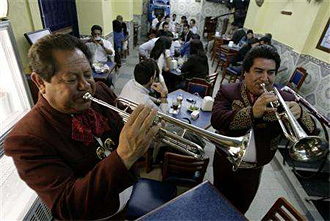 |
 |
 |
 News Around the Republic of Mexico | November 2007 News Around the Republic of Mexico | November 2007  
Power Omelettes Kill Mexico's Boozy Business Lunch
 Catherine Bremer - Reuters Catherine Bremer - Reuters
go to original


| | Traditional Mexican mariachi musicians perform in La Polar Bar in Mexico City November 16, 2007. The long Mexican business lunch, a tequila-fueled food orgy that could last past sundown, is on the demise in the capital as a new generation of clean-living executives cuts back on costs and time wasting. In an old habit as Mexican as mariachi, offices would empty for entire afternoons as employees packed into restaurants for hours-long feasts crucial for cementing business relations, even if they might leave people too drunk to sign deals. (Reuters/Daniel Aguilar |
Mexico City - The long Mexican business lunch, a tequila-fueled food orgy that could last past sundown, is on the demise in the capital as a new generation of clean-living executives cuts back on costs and time wasting.

In an old habit as Mexican as mariachi, offices would empty for entire afternoons as employees packed into restaurants for hours-long feasts crucial for cementing business relations, even if they might leave people too drunk to sign deals.

But for the younger generation, "power breakfasts" are in vogue, with Mexico City executives meeting over a pre-work plate of scrambled eggs and getting to the office, sober, by mid-morning.

"I almost never go out for lunch with clients. Nobody does any more, we don't have time," said Carlos Cazares, a young executive at an international food and drink company.

"People do business in office visits. If anyone showed up drunk from a long lunch they likely wouldn't keep their job."

Longer-in-the-tooth businessmen still do leisurely lunches, which typically start with tequila shots and run through chile-laced soups, quesadillas, rice, steak and fish dishes, washed down with beer or wine and rounded off with liqueurs.

Extended lunches are still common away from the capital but in business areas of Mexico City, many tables are cleared by mid-afternoon as a new U.S.-inspired professionalism weeds some of the decadence and cronyism out of Mexico's business elite.

Expense accounts are more closely scrutinized, employees are held more accountable for their work hours and flashing the corporate plastic to pick up a big bar tab is no longer cool.

"You can feel it's on the way out. It's a generational thing. Lawyers can no longer afford to spend all afternoon in a restaurant," said Guadalupe Loaeza, a newspaper columnist and well-known society commentator.

"The tradition still exists and the temptation is always there, but people think twice now. Mexican society has changed a lot, it's more mature, more respectful of others. Long lunches are seen as old fashioned and kind of bad taste."

EGGS AND COFFEE

A surge in women executives is also killing off the calorie-loaded "comidas" which could launch businessmen on a bar crawl that led to a strip club or into the arms of a mistress in a pay-by-the-hour hotel.

Even in government offices, where it used to be pointless phoning anyone between 2 p.m. and 6 p.m., people are ordering sushi takeaways and leaving in time to have a free evening.

The federal government shortened the working day in 1999, which meant slashing the standard three-hour lunch to about an hour so that people could leave the office earlier at night.

Bankers now average an hour and a half at table in a sushi restaurant in the swanky Lomas de Chapultepec district and rarely drink more than a glass of sake, the manager says.

"We're still busy at lunch time. But it's a tiny number now who stay and drink until midnight," said Jesus Jimenez, a valet parking attendant at a Mediterranean-style eatery next door.

A leafy terrace cafe in the next street is cashing in on the breakfast fad and now fills with suits from 8 a.m.

"They come to sort out business. They eat some eggs, close the deal and leave," said manager Miguel Angel Camacho.

The demise of the boozy lunch is one more sign of the U.S. influence, which pervades Mexico's middle-class. Many of the country's top executives have U.S. degrees or work experience.

"I only go out for long lunches once every three or four weeks," said Joe Kutchera, an American sales executive who moved to Mexico City a year ago. "Breakfast is nice because it's only an hour. The places get packed. Everyone's having eggs and coffee and catching up with their clients."

Not everyone is happy with the changes. Some worry that shorter lunch hours mean people are gulping down greasy street food or eating pizzas at their desks, which could worsen soaring obesity and diabetes levels in Mexico.

"We have to move back," said Roberto Burdese, the president of the Italian chapter of Slow Food, an international group that pushes for a return to quality diets, during a meeting of the group in Mexico. "We can spend less time eating, but we should eat better and at the table."

Editing by Eddie Evans | 
 | |
 |



